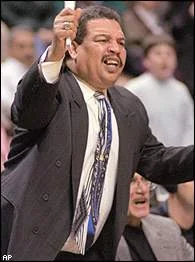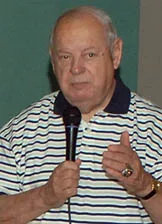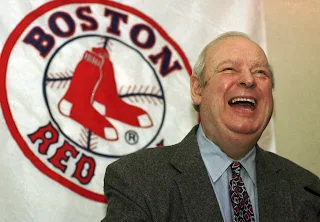
Larry Finch was a player and coach for the University of Memphis men's basketball team died he was , 60.. He is perhaps most famous for leading the Memphis State Tigers to the NCAA men's basketball championship game in 1973 in a heroic loss to the UCLA Bruins, led by Bill Walton.
(February 16, 1951 - April 2, 2011) |
Playing career
 Finch was born in Memphis, and played basketball for Melrose High School in the Orange Mound section of Memphis. He then entered Memphis State and played basketball under famed basketball coach Gene Bartow. This decision was somewhat controversial for both Memphis' black and white communities, given the recent assassination of Martin Luther King and the resultant heightened strain on race relations in Memphis, not to mention so few local African-American prep stars had been able to wear a Tiger uniform to that point. Some had advised Finch not to go, but whether or not he saw it as an opportunity to do something even more meaningful than playing for his local university, Finch loved his hometown team. As he led the Tigers to new heights of success, at least during basketball games, Memphians had a chance to see things less in black and white and more in Tiger blue and gray.
Finch was born in Memphis, and played basketball for Melrose High School in the Orange Mound section of Memphis. He then entered Memphis State and played basketball under famed basketball coach Gene Bartow. This decision was somewhat controversial for both Memphis' black and white communities, given the recent assassination of Martin Luther King and the resultant heightened strain on race relations in Memphis, not to mention so few local African-American prep stars had been able to wear a Tiger uniform to that point. Some had advised Finch not to go, but whether or not he saw it as an opportunity to do something even more meaningful than playing for his local university, Finch loved his hometown team. As he led the Tigers to new heights of success, at least during basketball games, Memphians had a chance to see things less in black and white and more in Tiger blue and gray.In his senior year at Memphis State, 1972–1973, he and Larry Kenon led the basketball team to the Final Four. In the championship game, Finch scored 29 points, but lost to John Wooden's UCLA Bruins, a game where Bill Walton went 21 of 22 from the floor. Finch graduated the all-time leading scorer in Memphis history, and is currently the second all-time leading scorer for the University of Memphis.
Finch was drafted by the Los Angeles Lakers in 1973, but opted to join the local American Basketball Association team, the Memphis Tams. Finch played professionally for two years with the Tams, the Memphis Sounds and the Baltimore Hustlers and Baltimore Claws.
Coaching career
In the 1980s, Finch was an assistant coach for Dana Kirk at Memphis State. Kirk was forced to leave Memphis State after violating NCAA regulations and becoming the subject of a criminal investigation, and Finch was made head coach in 1986 in order to restore order to the program. He would remain at the school, which was renamed the University of Memphis in 1994, until 1997.Finch posted 10 out of 11 winning seasons, seven 20+ win seasons, and six NCAA tournaments. He recruited and developed such players as Elliot Perry, Penny Hardaway, and Lorenzen Wright. His 1991-92 team led by Hardaway and David Vaughn went to the Elite Eight of the NCAA tournament. During his tenure, the basketball players began to graduate in high numbers.
As a player, Finch was known for his shooting prowess, and his skills remained intact throughout his coaching days; he would routinely win games of H-O-R-S-E against his players and against assistant coaches in long distance shooting contests after road game practices. Even while head coach, he maintained connections to his roots; he often visited Orange Mound barbershops, often delivering Memphis State posters and other team paraphernalia.
Despite Finch's overall success, during the mid-90's more and more local blue chip recruits began leaving for other schools, specifically Todd Day to the University of Arkansas and others to the University of Tennessee. This ultimately led to fan dissatisfaction for a program that was renowned for achieving national prominence on primarily Memphis-area talent. And while there was the Elite Eight team of 91-92, there were also teams considered under-achievers, such as the highly touted 1995-96 squad which lost to 12th seeded Drexel University in the first round of the NCAA Tournament. At the same time, Finch's speech seemed to deteriorate and it was said the players ignored him.
He was fired at the end of the 1996-97 season. The firing was a public relations fiasco for the university, as he was told of the decision immediately following his final game, in one of the concession areas of the Pyramid Arena. Although much of the fan base had become disenchanted with Finch, even some of his detractors were critical of the way school officials handled it. He left as the school's all-time winningest coach, a standing he recovered in 2009 after the John Calipari-led 2007-08 unit had its entire season vacated due to an academic fraud scandal.
In 1998 he ran for the office of Shelby County Registrar and lost to the incumbent by only 127 votes despite having no government experience. He was briefly in the running for coaching positions at Tennessee State, Georgia State, and South Alabama.
In 2002, Finch suffered a debilitating stroke. People close to Finch created the Friends of Larry Finch Foundation to help offset his medical expenses. In December 2006, the Foundation released a Larry Finch tribute CD called "Eye of the Tiger", featuring performers from Memphis' diverse musical community such as Al Green, The Bar-Kays, Gary Johns, John Kilzer, and Al Kapone.
Head coaching record
Season | Team | Overall | Conference | Standing | Postseason | ||||
1986-1987 | Memphis State | 26-8 | 8-4 | 2nd | Ineligible due to NCAA violations | ||||
1987-1988 | Memphis State | 20-12 | 6-6 | T-3rd | NCAA 2nd Round | ||||
1988-1989 | Memphis State | 21-11 | 8-4 | T-2nd | |||||
1989-1990 | Memphis State | 18-12 | 8-6 | 4th | |||||
1990-1991 | Memphis State | 17-15 | 7-7 | T-4th | NIT 2nd Round | ||||
Memphis State: | 102-58 | 37-27 | |||||||
1991-1992 | Memphis State | 23-11 | 5-5 | T-3rd | NCAA Elite Eight | ||||
1992-1993 | Memphis State | 20-12 | 7-3 | 2nd | |||||
1993-1994 | Memphis State | 13-16 | 4-8 | T-5th | |||||
1994-1995 | Memphis | 24-10 | 9-3 | 1st | NCAA Sweet 16 | ||||
Memphis State/Memphis: | 80-49 | 25-19 | |||||||
1995-1996 | Memphis | 22-8 | 11-3 | 1st (White) | |||||
1996-1997 | Memphis | 16-15 | 10-4 | T-1st (White) | |||||
Memphis: | 38-23 | 21-7 | |||||||
Total: | 220-130 | ||||||||
| National Champion Conference Regular Season Champion Conference Tournament Champion Conference Regular Season & Conference Tournament Champion Conference Division Champion | |||||||||













